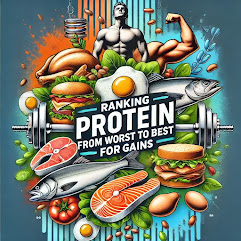Did you know that some protein sources can actually hinder your muscle gains?
For example, certain plant-based proteins may not provide all the essential amino acids your body needs! When it comes to building and repairing muscle tissue, not all protein sources are created equal. In fact, some can even do more harm than good if you're not careful. So, how do you know which protein foods are truly the best for maximizing your gains?
There's a lot of confusion surrounding which protein foods are actually beneficial for muscle building and recovery. Some people swear by whey protein, while others claim that plant-based sources like pea or rice protein are the way to go. But the truth is, most of us are just guessing when it comes to choosing the right protein for our fitness goals. We've all been there - scrolling through social media, seeing fitness influencers promoting their favorite protein powders, and wondering if we should be using them too.
But here's the thing: protein quality is not just about the amount of protein you're consuming. It's also about the type of protein, the amino acid profile, and the overall nutritional value. For instance, some plant-based proteins may be high in protein, but low in certain essential amino acids that your body needs to build and repair muscle tissue. And on the other hand, some animal-based proteins may be high in protein, but also high in saturated fat and cholesterol.
So, how do you cut through the confusion and choose the right protein sources for your fitness goals?
Well, that's what we're going to cover in this video. We're going to rank protein foods from worst to best, based on factors like protein quality, amino acid profile, and nutritional value. By the end of this video, you'll know exactly which protein sources to prioritize for maximum gains.
Let's start with the worst protein sources.
These are the ones that are either low in protein, low in essential amino acids, or high in unwanted nutrients like sugar or saturated fat. Some examples include protein sources like fruit smoothies, protein-fortified plant-based milk, and even some types of protein bars. These may seem like convenient options, but they're not doing your body any favors when it comes to building and repairing muscle tissue.
On the other hand, there are protein sources that are decent, but not ideal. These may be high in protein, but lacking in certain essential amino acids or nutrients. Some examples include protein sources like beans, lentils, and even some types of fish. Don't get me wrong - these can still be part of a healthy diet, but they're not the best options if you're trying to maximize your gains.
Now, let's get to the good stuff. The top protein sources that provide the best benefits for gains are the ones that are high in protein, high in essential amino acids, and low in unwanted nutrients. These are the protein sources that will help you build and repair muscle tissue quickly and efficiently. So, what are they?
In at number three, we have lean beef. Lean beef is an excellent source of protein, and it's also rich in essential amino acids like branched-chain amino acids, or BCAAs. It's also relatively low in fat and calories, making it an ideal option for those looking to build lean muscle mass.
In at number two, we have chicken breast. Chicken breast is one of the highest-quality protein sources out there, with an amino acid profile that's almost identical to whey protein. It's also extremely lean, with virtually no fat or calories.
And in at number one, we have egg whites. Egg whites are essentially pure protein, with an amino acid profile that's virtually unmatched. They're also incredibly versatile, and can be easily added to omelets, smoothies, or even used as a protein powder substitute.
So, there you have it , the ranking of protein foods from worst to best for gains. Remember, it's not just about consuming protein - it's about consuming high-quality protein that provides the right nutrients for your body to build and repair muscle tissue.
If you have a favorite protein source, let me know in the comments below.

